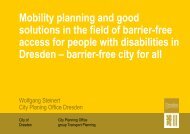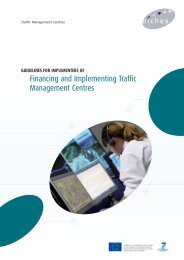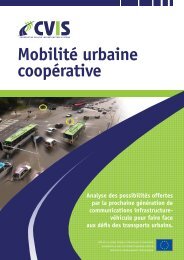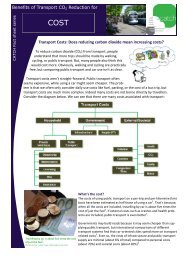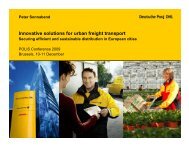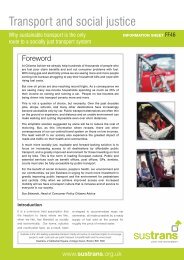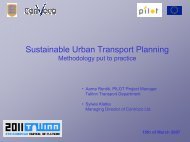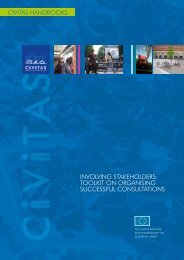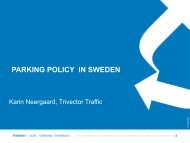EU funds for roads - CEDR
EU funds for roads - CEDR
EU funds for roads - CEDR
Create successful ePaper yourself
Turn your PDF publications into a flip-book with our unique Google optimized e-Paper software.
Page 56 / 80<br />
e) The eligibility of the various types of road projects (i.e. construction, design, maintenance<br />
etc.) by each <strong>EU</strong> fund is usually determined by the regulation governing the operation of<br />
each fund. Restrictions exist <strong>for</strong> the <strong>roads</strong>’ maintenance and operation projects and some<br />
road-works’ management projects. Considering that in many developed <strong>EU</strong> member<br />
states⎯but also in a growing number of other member states⎯the road infrastructure is<br />
already complete or will be completed rather soon, the EC should start thinking about<br />
considering as eligible road projects that do not involve the construction of new<br />
infrastructure, but deal with operational improvement (e.g. ‘incident management’) and the<br />
maintenance of <strong>roads</strong>. The eligibility of all road-related types of projects will also contribute<br />
to the implementation of integrated road development solutions, based on the life-cycle costmanagement<br />
approach.<br />
f) The securing of <strong>EU</strong> <strong>funds</strong> <strong>for</strong> the implementation of road projects by a Potential Recipient<br />
Authority (PRA) presupposes a series of actions taken at <strong>EU</strong> and national levels through<br />
which <strong>EU</strong> <strong>funds</strong> are made available <strong>for</strong> engagement in road projects. The PRA will then<br />
have to ‘compete’ with other eligible authorities to get its projects approved <strong>for</strong> co-financing<br />
by <strong>EU</strong> <strong>funds</strong>. This procedure is fair but takes a lot of time, and time is a very precious,<br />
scarce element when it comes to the use of <strong>EU</strong> <strong>funds</strong>.<br />
g) In order to be successful in applying <strong>for</strong> co-financing <strong>for</strong> its road projects by <strong>EU</strong> <strong>funds</strong>, a<br />
PRA should develop its relevant capacity and follow a number of practical guidelines.<br />
However, even following all these guidelines is not a guarantee of success if many PRAs<br />
compete <strong>for</strong> the same <strong>funds</strong>.<br />
h) Furthermore, even when the co-financing of a project by an <strong>EU</strong> fund is approved, the <strong>EU</strong><br />
<strong>funds</strong> may not ultimately be received by the recipient authority if all the requirements of the<br />
<strong>EU</strong> fund Regulation are not fulfilled.<br />
i) The ‘bureaucracy’ involved in using <strong>EU</strong> <strong>funds</strong> is onerous; in certain cases this leads to<br />
questions being raised about the ultimate benefit of their use. This issue is acute in countries<br />
that have not integrated the rules, procedures, and practices required by the <strong>EU</strong> <strong>funds</strong>’<br />
Regulations into their own (national) legal and regulatory framework and are obliged to<br />
implement them in parallel to their own framework. Besides all these ‘weaknesses’, most<br />
countries and organisations are very keen to get and use <strong>EU</strong> <strong>funds</strong>, mainly because they are<br />
subsidies (grants) that do not have to be repaid.<br />
j) It is true to say that ‘poor’ countries are happy to receive <strong>EU</strong> <strong>funds</strong> because this funding<br />
allows them to increase their funding capacity <strong>for</strong> investment projects and at the same time<br />
to improve their management capacity, while ‘rich’ countries are also happy NOT to receive<br />
<strong>EU</strong> <strong>funds</strong> because not getting <strong>EU</strong> funding saves costs and means that these countries are<br />
not under pressure to prepare and implement their projects and are not subject to the tight<br />
deadlines imposed by the <strong>EU</strong> <strong>funds</strong>’ restricted implementation periods.<br />
k) In addition to the grants from <strong>EU</strong> <strong>funds</strong>, a PRA may also use loans from the European<br />
Investment Bank. The lending conditions attached to these loans are much better than the<br />
conditions attached to loans from commercial banks. In addition to the good terms of the<br />
loans, the procedure <strong>for</strong> application, approval, disbursement, and servicing is easier <strong>for</strong> the<br />
recipient and quite swift. EIB loans are, there<strong>for</strong>e, very attractive.<br />
<strong>EU</strong> <strong>funds</strong> <strong>for</strong> <strong>roads</strong>





